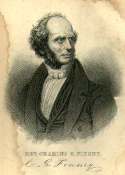Charles Finney, one of the greatest of the nineteenth-century evangelists, penned a systematic theology that has too long been neglected by the church as a whole. Some people consider parts of his theology to be controversial; I say he is refreshing and bold in his explanation of the Biblical message.
 Since he was primarily an evangelist, even those who are aware of his theology are in the dark on his views of politics and government. Finney lived in an era when slavery was a crucial issue, and he argued for its extinction. He also had some pertinent commentary on the role of government and Christian involvement in politics. For instance, he sees government as ordained by God and accountable to Him:
Since he was primarily an evangelist, even those who are aware of his theology are in the dark on his views of politics and government. Finney lived in an era when slavery was a crucial issue, and he argued for its extinction. He also had some pertinent commentary on the role of government and Christian involvement in politics. For instance, he sees government as ordained by God and accountable to Him:
As the great law of benevolence, or universal good willing, demands the existence of human governments, all men are under a perpetual and unalterable moral obligation to aid in their establishment and support. In popular or elective governments, every man having a right to vote, every human being who has moral influence, is bound to exert that influence in the promotion of virtue and happiness. And as human governments are plainly indispensable to the highest good of man, they are bound to exert their influence to secure a legislation that is in accordance with the law of God. The obligation of human beings to support and obey human governments, while they legislate upon the principles of the moral law, is an unalterable as the moral law itself.
Finney never would have understood the modern mania for “separation of church and state,” as evidenced by these words:
In a popular government, politics are an important part of religion. No man can possibly be benevolent or religious, to the full extent of his obligations, without concerning himself, to a greater or less extent, with the affairs of human government. It is true, that Christians have something else to do than to go with a party to do evil, or to meddle with politics in a selfish or ungodly manner. But they are bound to meddle with politics in popular governments, because they are bound to seek the universal good of all men; and this is one department of human interests materially affecting all their higher interests.
In other words, Christians are under an obligation to be involved since government makes an impact on all of life. For those who would argue that Christians should abstain from lawmaking, Finney retorts,
It is admitted that selfish men need, and must feel the restraints of law; but yet it is contended that Christians should have no part in restraining them by law. But suppose the wicked should agree among themselves to have no law, and therefore should not attempt to restrain themselves, nor each other by law; would it be neither the right nor the duty of Christians to attempt their restraint, through the influence of wholesome government? It would be strange that selfish men should need the restraints of law, and yet that Christians should have no right to meet this necessity by supporting governments that will restrain them. It is right and best that there should be law. It is even absolutely necessary that there should be law. Universal benevolence demands it; can it then be wrong in Christians to have anything to do with it?
Government also has an obligation—to act in accordance with God’s moral law:
It follows that no government is lawful or innocent that does not recognize the moral law as the only universal law, and God as the Supreme Lawgiver and Judge, to whom nations in their national capacity, as well as individuals, are amenable. The moral law of God is the only law of individuals and of nations, and nothing can be rightful government but such as is established and administered with a view to its support.
So what would Finney think about overturning “Don’t ask, don’t tell”? You don’t even need to ask; he has already told us.
